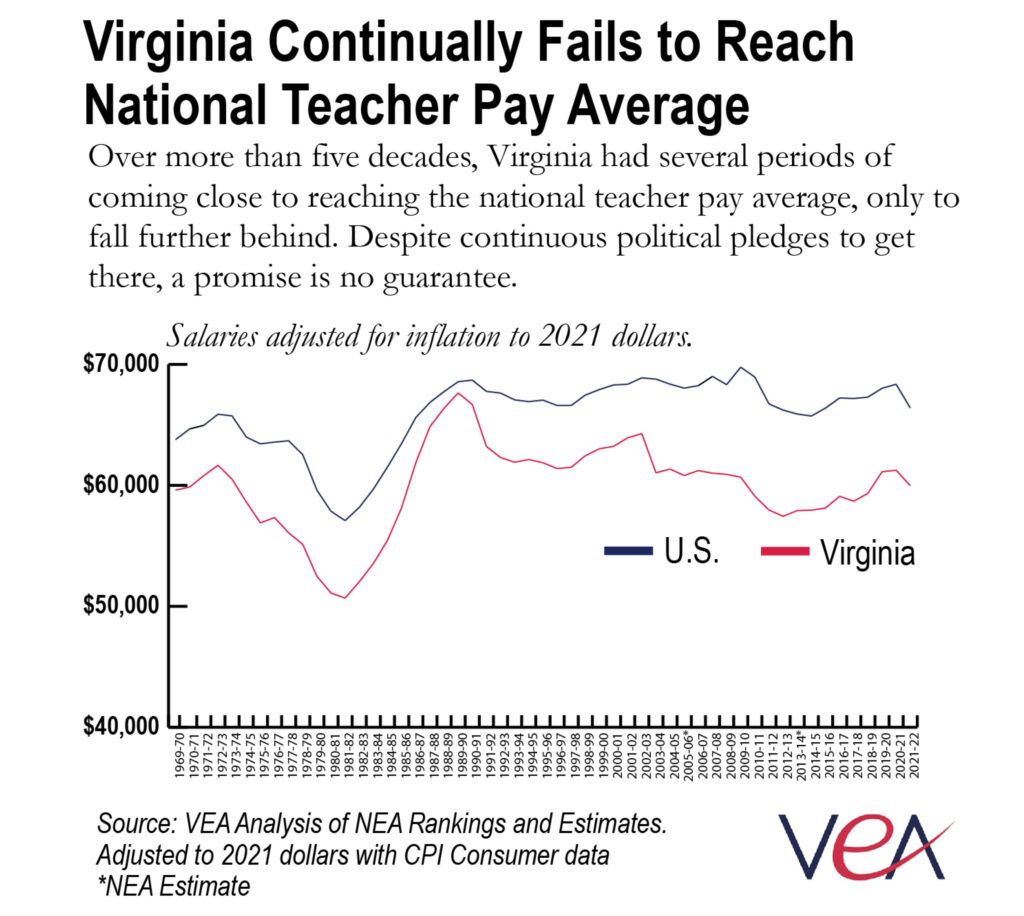Past Due: Time for Virginia Lawmakers to Keep their Promise on Teacher Pay
May 5, 2022
May 5, 2022
We’ve all heard the expression “striving for excellence,” but how about “striving for average”? That’s been Virginia’s goal for teacher pay for more than five decades, and the consequences of the low pay in terms of staffing shortages and burnout have hit a crisis level in many schools.
Virginia governors have long promised to get to the national teacher pay average, with Governor Baliles coming closest in the 1989-1990 school year. Yet, over the past five decades, Virginia has fluctuated, coming anywhere from within 14 to 1 percent of closing the gap between the Virginia and national teacher pay average. The method to reach the national average is actually quite simple: to get to the national teacher pay average, the state should pay the national teacher pay average. This should be a bare-bones goal, as Virginia has a higher cost of living and pay for professionals with a college education than most states, meaning our teacher pay still wouldn’t be competitive if we reached the national average. Virginia lawmakers can make meaningful progress as they finalize the upcoming two-year state budget and provide a 5% annual pay increase for educators (as proposed by the state Senate), and pledge to come back in the next budget cycle to finally get Virginia to the national average.

According to recently released data by the National Education Association, Virginia unfortunately fell further behind the national average in the 2020-2021 year compared to the previous year. Using preliminary estimates of what the Virginia teacher pay average is for the current school year and projections of the growth of the national average, it’s clear that even the highest floated proposal in the state budget for increasing teacher pay over the next two school years (5% annually), wouldn’t get us to the national average – we’d still be short thousands of dollars. The consequences of our low teacher pay in Virginia are already being felt, with painful staffing shortages that are slated to get worse over the coming decade without intervention. VEA analysis has found that these shortages are most severe in divisions with the highest share of students experiencing poverty, Black students, and students of color in general. With teachers reporting inadequate pay as the leading factor in decisions to leave their roles, lawmakers can directly affect our educator shortage by prioritizing more adequate pay in the budget.
There is ample surplus available for the upcoming two-year state budget to make meaningful investments in teacher pay. There’s even enough to get to the national average. The Virginia House proposed a salary increase for teachers that was 20% lower than what the Senate proposed. One likely reason for this discrepancy is that the House also proposed larger tax cuts for moderate to high income individuals and corporations, while the Senate proposed more targeted tax cuts for low income families, leaving more room for K-12 investments. Virginia’s children can not afford for the school staffing crisis to carry on or get worse over the coming years, and lawmakers’ failure to provide competitive pay over the decades is now exacting a heavy cost. Lawmakers have an opportunity in the upcoming budget to prioritize our students and education system and turn the tide on our state being known for its historically low pay for hard-working educators.
According to a poll conducted by Virginia Commonwealth University, 66% of Virginians say public schools do not have enough funding to meet their needs.
Learn More